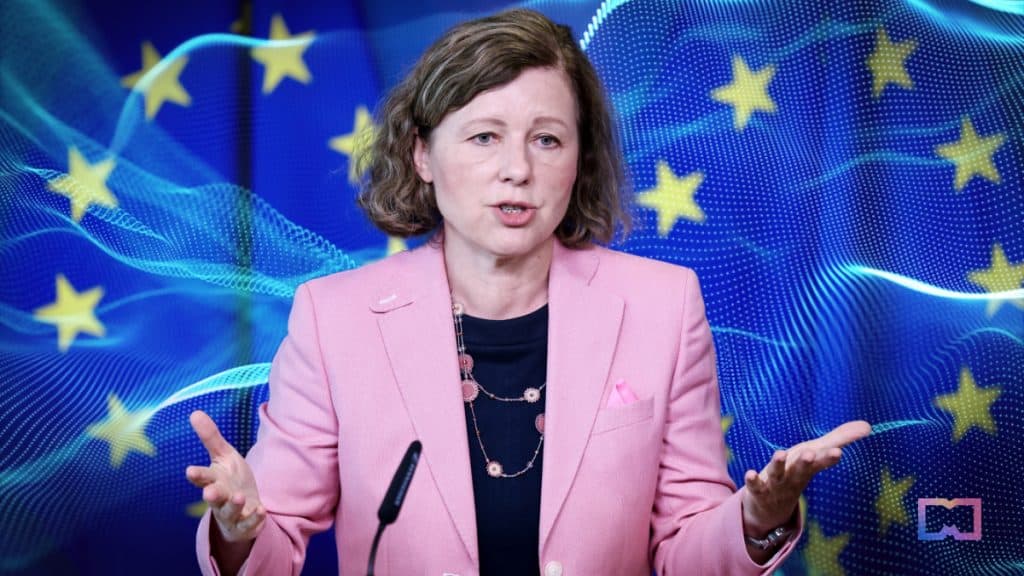EU Urges Tech Giants to Label AI-Generated Content to Fight Disinformation


In Brief
The European Commission has urged tech giants like Google, Facebook, and TikTok to combat disinformation by clearly labeling content and images generated by artificial intelligence.
Vera Jourova, the Commission’s vice president, emphasized that companies using generative AI capable of producing fake news should take responsibility.
Jourova stated that companies providing generative AI services, such as Bingchat for Microsoft and Bard for Google, should implement safeguards to prevent malicious actors from using these services for disseminating disinformation.

The European Commission has called on tech giants such as Google, Facebook, and TikTok to take action against disinformation by clearly labeling content and images produced by artificial intelligence. Vera Jourova, the vice president of the Commission, stated on Monday that companies that use generative AI technologies capable of creating fake news should label such content as part of their responsibility to combat disinformation from sources such as Russia.
Jourova said in a press conference that signatories who use generative AI in their services, such as Bingchat for Microsoft and Bard for Google, should implement safeguards to prevent malicious actors from using these services to generate disinformation.
“Signatories who have services with a potential to disseminate AI-generated disinformation should in turn put in place technology to recognize such content and clearly label this to users,”
Jourova added.
Companies like Google, Microsoft, and Meta, which have signed the EU Code of Practice to combat disinformation, should report on the safeguards they have implemented in July. She also warned that Twitter, which recently left the Code, could expect increased regulatory scrutiny. Jourova said that Twitter’s actions and compliance with EU law would be closely and urgently monitored.
Elon Musk’s company left the EU’s voluntary Code of Practice two weeks ago. If Twitter does not operate under the Digital Services Act, it could face a fine of up to 6% of its global revenue based on recent estimated earnings or be banned across the EU.
Last month, European lawmakers approved stricter draft legislation to regulate AI. The act includes requirements for foundational models that underpin generative AI technologies, such as safety checks, data governance measures, and risk mitigations. The list of prohibited practices was expanded to include intrusive and discriminatory uses of AI systems.
Read more:
- EU Reaches Early Agreement on AI Act with Focus on Transparency and Risk Mitigation
- EU Lawmakers Call for Summit on Powerful AI and Stricter Regulation of ChatGPT-Like Systems
- China’s new content policy: Why media files created by AI must now be watermarked
Disclaimer
In line with the Trust Project guidelines, please note that the information provided on this page is not intended to be and should not be interpreted as legal, tax, investment, financial, or any other form of advice. It is important to only invest what you can afford to lose and to seek independent financial advice if you have any doubts. For further information, we suggest referring to the terms and conditions as well as the help and support pages provided by the issuer or advertiser. MetaversePost is committed to accurate, unbiased reporting, but market conditions are subject to change without notice.
About The Author
Agne is a journalist who covers the latest trends and developments in the metaverse, AI, and Web3 industries for the Metaverse Post. Her passion for storytelling has led her to conduct numerous interviews with experts in these fields, always seeking to uncover exciting and engaging stories. Agne holds a Bachelor’s degree in literature and has an extensive background in writing about a wide range of topics including travel, art, and culture. She has also volunteered as an editor for the animal rights organization, where she helped raise awareness about animal welfare issues. Contact her on agnec@mpost.io.
More articles

Agne is a journalist who covers the latest trends and developments in the metaverse, AI, and Web3 industries for the Metaverse Post. Her passion for storytelling has led her to conduct numerous interviews with experts in these fields, always seeking to uncover exciting and engaging stories. Agne holds a Bachelor’s degree in literature and has an extensive background in writing about a wide range of topics including travel, art, and culture. She has also volunteered as an editor for the animal rights organization, where she helped raise awareness about animal welfare issues. Contact her on agnec@mpost.io.





















































